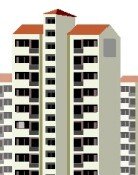N. Korea vows to build fortresses to permanently blockade border with S. Korea
N. Korea vows to build fortresses to permanently blockade border with S. Korea
Posted October. 10, 2024 07:47,
Updated October. 10, 2024 07:47
North Korea announced on Wednesday that it will “permanently blockade and lock down the southern border,” completely cutting off roads and railways to South Korea and fortifying border areas with solid defensive structures. The North Korean military's General Staff claimed that the move was a “practical military measure to thoroughly separate the territory of the DPRK from the territory of the Republic of Korea in the exercise of our sovereignty,” adding that it had notified the move to the U.S. military to ‘prevent misunderstandings and accidental clashes.’ However, there was no sign of construction activity on the northern side of the inter-Korean truce line on Wednesday.
The North Korean military's declaration to block the border is apparently its manifestation of taking physical actions to separate the two Koreas in line with North Korean leader Kim Jong Un's declaration of ‘two hostile nations.’ Since the beginning of the year, North Korea has already laid landmines along the Gyeongui and Donghae railroads, dismantled railroad tracks, and erected a barrier in the Demilitarized Zone (DMZ) that is believed to be an anti-tank obstacle. The latest declaration represents the North’s move to formalize previously unannounced separation and barrier construction efforts, which Pyongyang has thus far been making without publicizing, and further increase these fortification measures.
While North Korea touts ‘strict separation into two countries,’ there are signs that its public messages have been ambiguous. This time, it referred to South Korea as the territory of the Republic of Korea but called its move as activities to exercise the territorial sovereignty of the DPRK, suggesting that its territorial concept has not yet been finalized. North Korea announced that it had revised parts of its constitution at a meeting of the Supreme People's Assembly on Monday and Tuesday, but it did not mention the removal of the unification concept or the introduction of a territorial clause, which it had announced. This could indicate that the abrupt course change is not going smoothly.
Kim Jong Un has also been sending out a series of clever double messages lately. In a speech on Monday, Kim threatened to use nuclear weapons against the South, but also said, “We honestly have no intention of attacking the Republic of Korea,” and that “We are no longer interested in the words of the past era of liberating the South and unifying the country by force.” It remains to be seen whether this is the posturing of a nuclear power that is confident of its deterrence and has become complacent, or whether it reveals its wariness over strengthening the South Korea-U.S. Korean nuclear deterrent.
North Korea is more likely to escalate military tensions in the future by conducting more aggressive operations, such as expanding fortifications and deploying military units in such areas. This time, the North Korean military took the measure of notifying the U.S. military in advance, claiming that it hoped to avoid accidental clashes due to misjudgment. This measure is apparently Pyongyang’s plot to stir up tensions along the Demilitarized Zone in the future, and then blame the South for its provocations under the guise of accidental clashes. It is time for the South Korean military to demonstrate its readiness and capabilities to manage crises calmly and cool-headedly.
Headline News
- Joint investigation headquarters asks Yoon to appear at the investigation office
- KDIC colonel: Cable ties and hoods to control NEC staff were prepared
- Results of real estate development diverged by accessibility to Gangnam
- New budget proposal reflecting Trump’s demand rejected
- Son Heung-min scores winning corner kick







